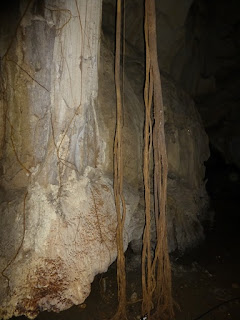In Nov 2014 I joined the UTM team for 3D scanning in a cave at Kota Gelanggi. In 2009 I had joined their scanning team at caves in
Lenggong, Perak.
The caves at Kota Gelanggi in Pahang are quite well known as some are open to the public. There is an entry fee of RM5.
It is now called a Cave Heritage Park but was deserted when we went there. As the others didn't know the caves, I suggested we do the scanning in Gua Terang Bulan . To get there we drove through Gua Jin (aka Gua Tongkat).
I had attended the official opening of Gua Terang Bulan as a show cave in 1998. The (56) stairs up to the cave were somewhat overgrown and also partly blocked by a fallen tree. There was quite a lot of heavy equipment to carry - the new Faro scanner "only" weighs about 20 kg !
The cave is gated -
44 steps lead down into the main passage -
There is/was electric lighting in the cave, though judging by the state of things and the generator outside, I doubt if the lights still work. The fixtures and fittings, walkway etc were all in terrible condition. Many of the handrails were broken and the debris just lying on the floor, including many light bulbs. Such a pity.
Fungi on a handrail -
We went through the cave to the end. A generally flat passage leads via steps into another long level passage
There are a few nice formations in the cave and some not so nice graffiti.
This is probably a survey station left by the Museums Dept when doing archaeological work
The passage goes up steeply into the final chamber. Steps go half way up into this chamber that is partly lit by daylight. This is where we started scanning.
Preparing the 16 marker balls for the scanning
Getting the scanner set up -
Each scan takes 7 minutes. During this time we had to sit in total darkness. After a few scans, I went ahead and out of range of the scanner and spent time looking for cave fauna.
Web spiders , including
Psechrus -
Long legged centipede,
Thereupoda -
Crickets
Whip spider -
Snails, probably
Subulina octona -
There were a few insect eating bats in the cave and many dead ones. Bat skeleton -
Unidentified bones -
Bird feathers -
I was quite intrigued by these burrowing spiders. There is a spider in every hole in this photo -
There were also crickets waiting by some of the burrows, but I don't know the reason. They all jumped away before I was able to get any photos. I was unable to get the spiders identified, they could be a burrowing species of wolf-spiders (
Lycosa sp.), or maybe
Damarchus or
Atmetochilus. There was a lot of insect debris by some of the holes, e.g. cockroach wings etc.
Roots coming into the cave
Some formations
In places the formations are starting to break down
The results -
For more on scanning techniques, see the
Lenggong blog.
See also
counting bats through scanning in Gua Kelawar, Langkawi, also scanning in
Bau caves.
--
© Liz Price
No reproduction without permission




















































